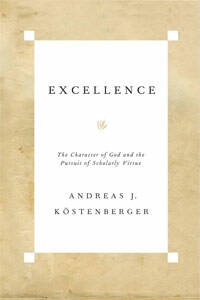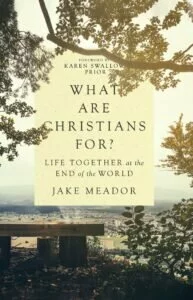Over the last three weeks I have explored the biblical accounts of creation and the fall in Genesis 1–3, and their significance for thinking about achievement. This is a natural place to pause and reflect on some more of the literature related to the theme, before pressing forward in the biblical narrative.
Andreas Köstenberger’s book, Excellence: The Character of God and the Pursuit of Scholarly Virtue, offers a very interesting approach to the topic of excellence. While he does not pursue the theme of achievement per se, some readers may recall that my working definition of achievement involves an intersection between work and excellence.
Köstenberger’s intended audience consists of young theological students and junior scholars, with whom he pleads “not to sacrifice their scholarly integrity for the sake of attaining academic respectability” (p. 24). So, the book is for theologians about doing theology well. This focus may not be of immediate interest to all of my readers, but the way that Köstenberger goes about making his argument is relevant for the entire topic, whatever our specific interests.
This focus may not be of immediate interest to all of my readers, but the way that Köstenberger goes about making his argument is relevant for the entire topic, whatever our specific interests.
Köstenberger grounds his thesis in the character of God: “God is the grounds of all true excellence” (p. 33); “Excellence starts and ends with God and is first and foremost a hallmark and attribute of God” (p. 34). This claim resonates strongly with my argument from Genesis 1 that God is an achiever, as we see demonstrated by his activities in creation. Excellence is “the quality of standing out or towering above the rest, being eminent or superior…God’s excellence is the ultimate point of reference for all true human excellence” (p. 35).
The call for human excellence is grounded in creation: “Not only should we strive for excellence because God himself is excellent, but also we ought to pursue excellence because we were each created in God’s image” (p. 36). Thus, according to Köstenberger, the bearing of God’s image mandates that we ought to pursue excellence: “Since we are all created in God’s image, everyone can be truly excellent…We can achieve excellence as we are increasingly fulfilling the potential God has built into us” (p. 37).
Furthermore, the call to excellence is all encompassing: “Excellence should describe our lives in their totality and encompass every area of our lives, no matter how large or small” (p. 38). It is “a divine mandate that applies to every aspect of our lives” (p. 40). Thus, “mediocrity, sloppy workmanship, and a half-hearted effort do not bring glory to God or advance his kingdom” (p. 40).
However, Köstenberger stresses that our efforts toward excellence are ultimately powered by God: “God is at work within us to develop excellence for his own glory, and at the same time we must also make every effort to pursue excellence to which God has called us” (p. 40). “God has supplied us with all that we need to attain excellence through our knowledge of God in our Lord and Savior Jesus Christ” (p. 51).
In evaluating Köstenberger’s contribution, I can affirm his theological grounding in the character of God, and in our creation in God’s image. However, there does not appear to be enough consideration of the affects of the fall in the question of excellence. Post-fall, can we really expect that all human beings have a mandate to be excellent in all they do? Or, if we do expect that, surely we must know that it is not possible in humanity’s current state (pre-eschaton).
I think, however, there is a tension between Köstenberger’s definition of excellence and his mandate for excellence. If excellence is the quality of standing out or towering above the rest, how can he also call everyone to excellence (because we are all created in God’s image)? Surely if everyone is excellent, no one will stand out from the rest. Isn’t this a self-defeating goal, then? And isn’t this definition of excellence too competitive to begin with?
Furthermore, is it not the case that Jesus Christ, the only perfect human being, has become what we cannot, and has done what we cannot, which includes the pursuit of excellence? Before we can contemplate our own attempts at excellence, must we not first inhabit the excellence of the only perfect man? He is what humanity failed to be; he alone fulfills God’s intention for humanity. It is only by being “in Christ” that we may partake in perfected humanity.
These lines of critique can only be posed as questions for now, since I am getting ahead of my own investigation of the Bible on this matter. Are there theological answers to these questions?








Comments
Be the first one to make a comment!